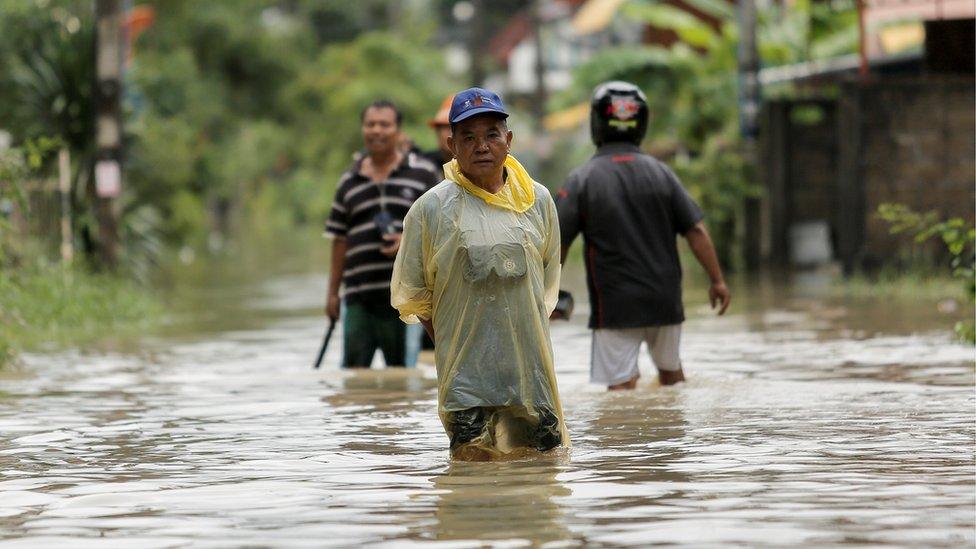Drenched Thailand still waiting for its green revolution
- Published
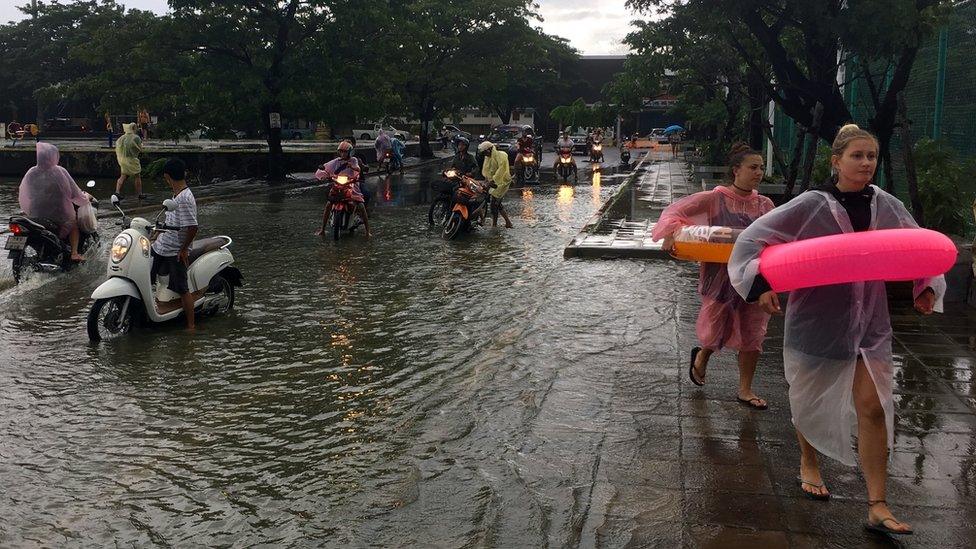
Tourists use inflatable rings to cross a road on the Thai island of Koh Samui
Mr Supit bows low, palms together, fingers pointing to the wrathful heavens above.
The north-east monsoon should have left the Thai island of Koh Samui more than a month ago, but the start of 2017 there has been greeted by a week of unremitting tropical storms.
Supposedly the high season, Mr Supit's hotel is dripping with umbrellas and soaking towels. The rains have prevented many staff from getting to work, made his international guests miserable and washed away his organic garden.
He breaks his wai - the traditional palms together gesture of greeting - throwing his arms apart with a shrug and a shake of his head. "What more can I do?" he asks.
"We are going to cross the sea in front of us," he jokes as he attempts to drive down Main Street, floodwater sloshing up to the gunwales of his Ford.
"This is very strange weather. We had similar storms five years ago, but that was in March. I have never known a new year like this. We are thinking this must be the result of climate change."
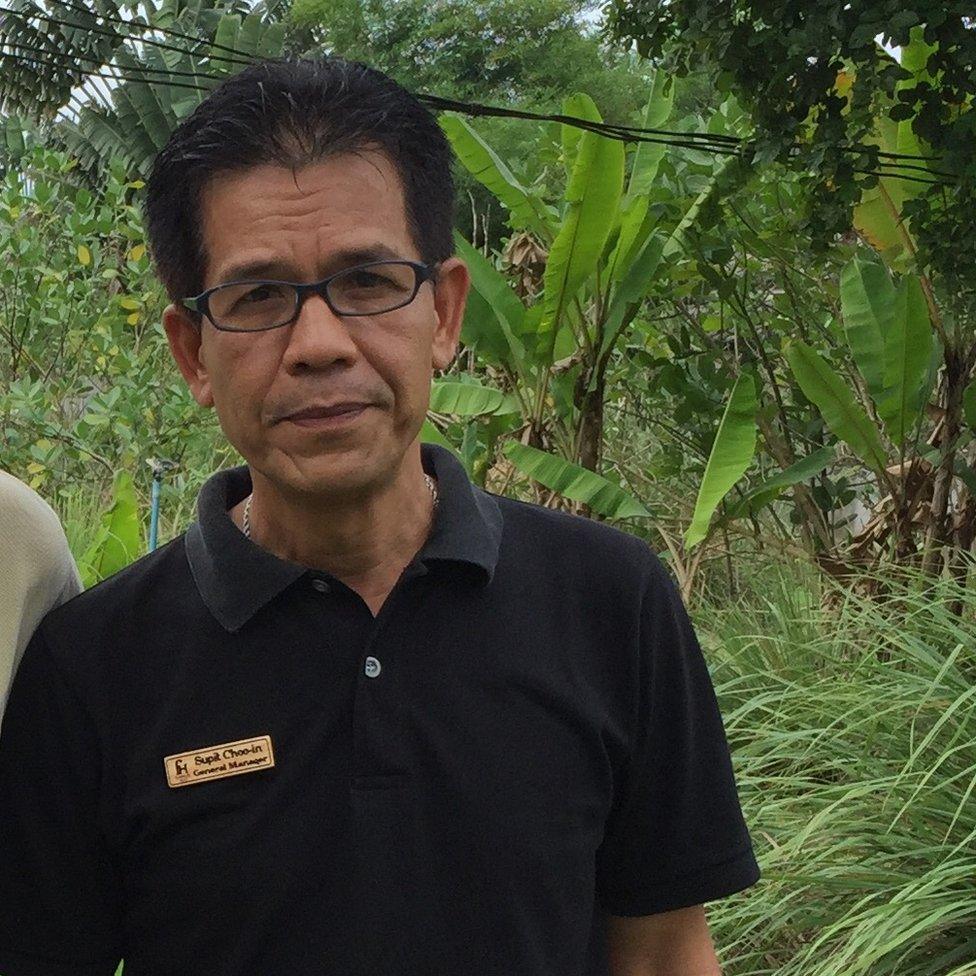
Supit Choo-in: "We must focus on green again."
Like the scooters abandoned beside the flooded roads, many of the resorts dotted around Samui's coast have spluttered to a stop. A few plucky guests have filmed themselves laughing on lilos bobbing down the street, beers in hand, but Thai tourism is an industry that floats on sunshine and there has been virtually none of that for a week.
The local TV news is reporting that hundreds of families on the holiday island have been left homeless, bridges are down and many roads are impassable beneath brown, malodorous floodwater. Elsewhere in the province, the unexpected deluge has killed at least 18 people.
A mile from his hotel, Mr Supit stops his car to look at a rockfall that has crashed across the ring road, red boulders brought down by the heavy rains. "We need to be focusing on green again," he murmurs.
Mr Supit recalls the environmental initiative launched with much fanfare by hoteliers and tour companies on Koh Samui in the late 90s after a landmark speech from the late king.
Thailand is still in mourning for King Bhumibol Adulyadej, who died last October after 70 years on the throne. Black and white shrines to his memory are everywhere, reverence for the monarch akin to worship of a deity, his utterances regarded almost as sacred texts.
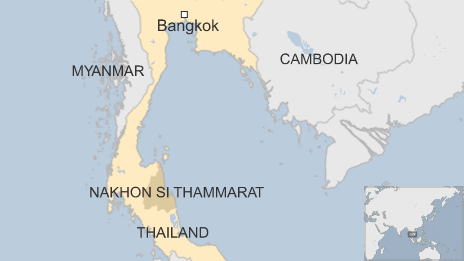
In 1997, after massive currency speculation led to the total collapse of the Thai economy, mass unemployment and food shortages, King Bhumibol addressed the nation. He appealed for what he called a "sufficiency economy", a philosophy of moderation, balance and caution that, he argued, would help Thailand cope with the socio-economic, cultural and environmental challenges of globalisation.
Some translated the speech as a decree to introduce a sustainable tourism policy - a change long overdue in a country that had witnessed almost unconstrained development for decades. Deforestation, the destruction of natural habitats and a brazen prostitution industry were among the ugly faces of the tourism goldrush.
Officials cautioned that without the kind of restraint implicit in the king's crisis speech, many of the unspoiled natural environments that attracted travellers would be destroyed. Thailand's famous white beaches would be lost to the sea, one minister warned. Vibrant marine habitats and dense tropical jungles would be obliterated.
A number of private hoteliers joined the Green Leaf Foundation, committing them to make their resorts carbon neutral. There are eco-friendly tour companies offering trips to the beautiful Angthong National Marine Park. On Koh Samui, a government-backed initiative called Seven Greens was introduced, promoting sustainable practices and philosophy.
Recently, the Ministry of Tourism has urged holiday businesses to focus on attracting "quality" visitors - sophisticated and environmentally aware travellers who will value Thailand's natural and cultural treasures. The days of low-cost mass tourism are supposed to be numbered.
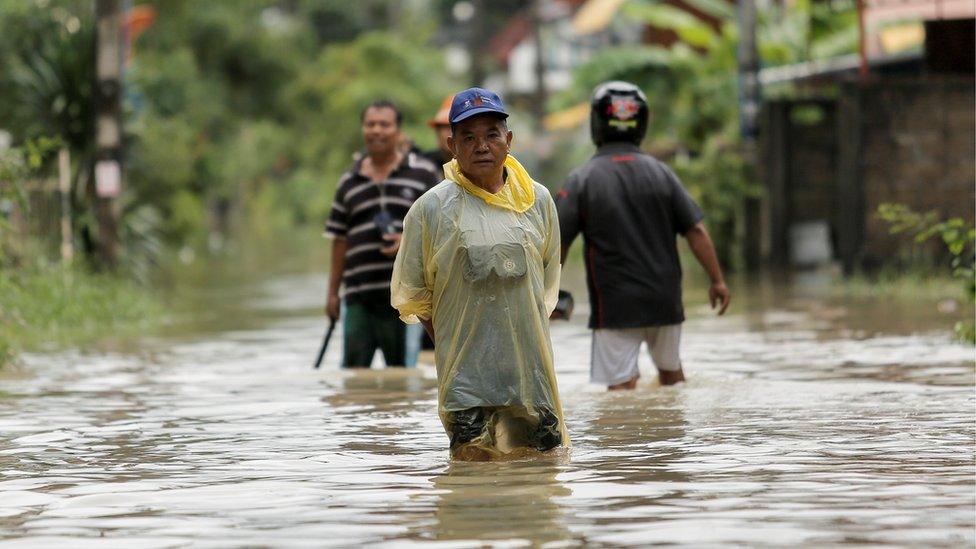
Unseasonal downpours in southern Thailand have turned many streets into canals
But political rhetoric has not always matched reality. The tourist strips are still overflowing with sex bars, cheap beer and greasy burgers. Among Koh Samui's top attractions are monkey shows that animal welfare groups blame for wiping out half of Thailand's white-handed gibbon population.
This is not a country that finds it easy to embrace the sacrifices of a green revolution: government figures suggest the average Thai uses an astonishing eight plastic bags a day. In the last two decades around 60 environmental activists have been killed in Thailand while campaigning against powerful logging companies and industrial polluters. Some question just how serious the military-backed government is in pursuing green policies.
In his flooded organic garden, Mr Supit reflects on the 40 years since he landed his first tourist job as a pot washer in a Bangkok kitchen.
"In the early days, people spent more money than now," he tells me as we assess the damage wreaked by the unwelcome storms.
In 1960, only 81,000 tourists visited Thailand, mostly high-rollers and adventurers from Europe and the Far East, people prepared to pay for something exotic. "Today many more come, but they don't spend - particularly the Chinese," Mr Supit laments.
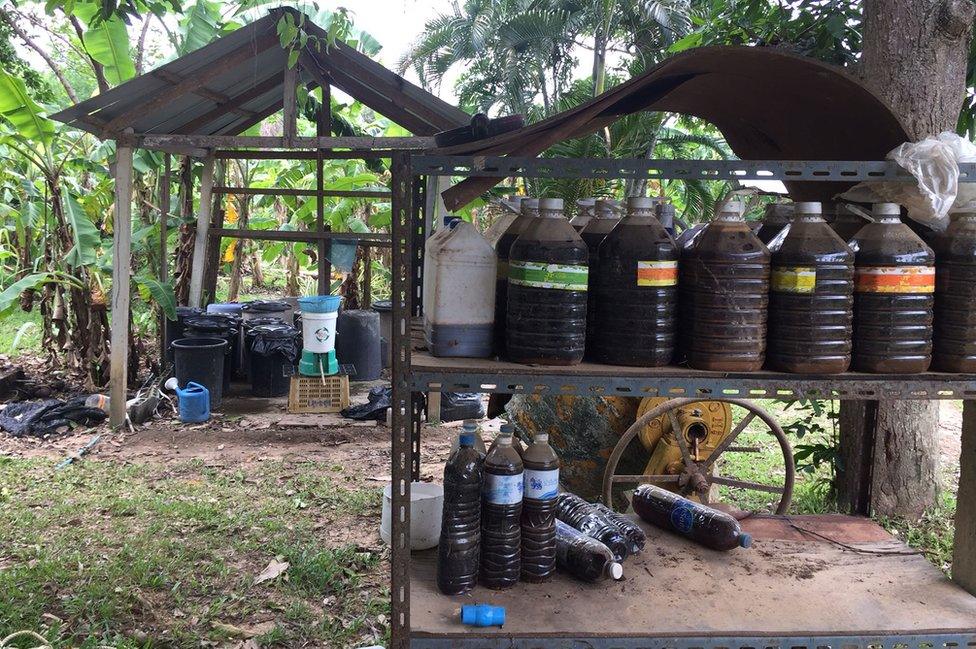
Not much is left of Mr Supit's organic garden
A record 33 million tourists visited Thailand in 2016, more than eight million of them from China, pushing revenues up 18% in a single year. But Mr Supit is not alone in worrying that the country is overstretching itself.
"I am very much concerned," he confides. "We have to lift up the quality and we must focus on green again. At the moment I don't think my guests are prepared to pay more for that."
His two-acre organic garden is an act of defiance: beds of traditional Thai basil and morning glory, lemongrass and lime trees are fed with homemade fertiliser, brewed on the plot from pineapple, molasses and water. When available, the Fairhouse Villa hotel chef makes full use of the fresh fruit, vegetables and spices. Sadly, his kitchen will not benefit for a while, with many of the garden's tender plants washed into the sea by the unseasonal storms.
"It is tough work," Mr Supit says, surveying the damage. "But we will keep planting. We will get there."
He smiles and looks ruefully at the darkening sky.
With the rains still falling, Thailand needs more people like Mr Supit.
- Published8 January 2017
